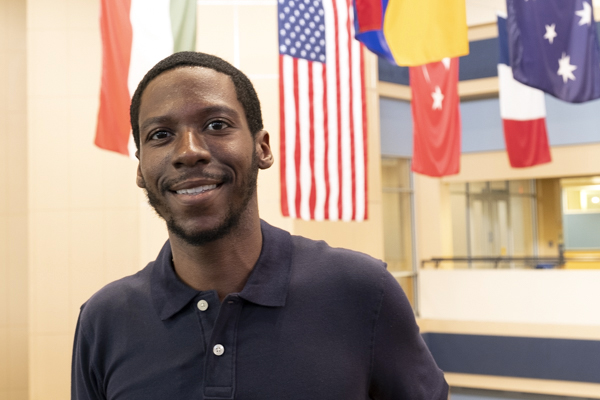UM-Flint student named to Michigan Secretary of State's task force to boost voter engagement

A University of Michigan-Flint student is a member of Michigan Secretary of State Jocelyn Benson's new initiative to improve voter engagement among young voters and college students.
Jeron Dotson of Flint was named to the 33-student Collegiate Student Advisory Task Force. The members of the task force are from 31 communities and 23 community colleges, colleges, and universities across Michigan.
The Collegiate Student Advisory Task Force will meet three times this fall and make recommendations for programs and or policy changes to the Secretary of State by the end of November. Next year, the students will be civic engagement liaisons on their respective campuses.
"I am proud of the many men and women across the state who have stepped up to lead and inform our office on how to best engage students in our democracy," Benson said in a press release. "I am confident with their insights and involvement we will develop a robust plan to break down existing barriers and ensure our elections are accessible to all."
Dotson, who is on track to graduate in 2020, is studying International Business and pursuing a minor in Mandarin Chinese. He's involved with the Entrepreneur Society and the International Business Club. With his brother, he's co-founded The Poké Bowl, a Hawaiian and Japanese-inspired restaurant that is slated to open in February on University Avenue in Flint.
Voter engagement was something Dotson has been interested in. He's involved in the Democratic Black Caucus in Genesee County and Rep. Dan Kildee, D-Flint Township. While at work at the Secretary of State office in downtown Flint, Dotson saw a post about the Collegiate Student Advisory Task Force. Later that day, he received an email about the posting, which sought college students who had been involved with voter engagement. He applied, and in mid-September, Dotson received an acceptance letter from Benson.
The task force, which has met once so far, started with identifying barriers and issues at various institutions, including examining differences between commuter schools and residential campuses. The students intend to create a unilateral plan that can work to increase voter efficacy and access at campuses across Michigan.
One of the barriers Dotson sees is a lack of knowledge about the process and candidates. Some students may not differentiate between a township or city clerk and the voting precinct, and they may have a lack of independent information about the candidates.
Another barrier is access to the polls. One solution could be offering shuttle services to get students to the voting booths, while another is creating satellite precincts that allow students to register where they live and vote on campus instead of having to go home to vote, Dotson said. The expansion of absentee ballots is another possible option to encourage students to vote.
"As much as we're programmed to think our vote doesn't count, it does. And definitely on a local level," he said.
Earlier this year, UM-Flint was designated as a Voter Friendly Campus by NASPA-Student Affairs Administrators in Higher Education and Fair Election Center's Campus Vote Project. The program is to boost student participation in elections and to help them overcome barriers to vote.
Related Posts
No related photos.
Lindsay Knake
Lindsay Knake is the Communications Coordinator for the UM-Flint Division of Student Affairs. Contact her with any questions, comments, or ideas about the DSA newsletter, social media, events, and communications.